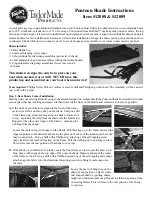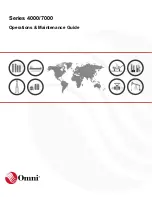
BeneVision N1 Patient Monitor Operator’s Manual
22 - 1
22
Maintenance
22.1
Maintenance Introduction
Regular maintenance is essential to ensure that the equipment functions properly. This chapter contains
information on periodic testing and maintenance.
22.2
Maintenance Safety Information
WARNING
•
To avoid electric shock, stop using N1 if you find the housing of N1 has signs of broken. Contact the
service personnel for help in that case.
•
Failure on the part of the responsible individual hospital or institution using this equipment to
implement a recommended maintenance schedule may cause undue equipment failure and
possible health hazards.
•
No modification of this equipment is allowed.
•
This equipment contains no user serviceable parts.
•
The safety checks or maintenance involving any disassembly of the equipment should be performed
by professional service personnel. Otherwise, undue equipment failure and possible health hazards
could result.
•
Do not open batteries, heat batteries to above 60 °C, incinerate batteries, or short the battery
terminals. Batteries may ignite, explode, leak or heat up, causing personal injury.
•
The service personnel must be properly qualified and thoroughly familiar with the operation of the
equipment.
CAUTION
•
If you discover a problem with any of the equipment, contact your service personnel or Mindray.
•
Use and store the equipment within the specified temperature, humidity, and altitude ranges.
•
When disposing of the packaging material, be sure to observe the applicable waste control
regulations and keep it out of children’s reach.
•
At the end of its service life, the equipment, as well as its accessories, must be disposed of in
compliance with the guidelines regulating the disposal of such products. If you have any questions
concerning disposal of the equipment, please contact Mindray.
NOTE
•
If needed, contact the manufacture for circuit diagrams, component part lists, descriptions,
calibration instructions, or other information concerning the repair of the equipment.
















































